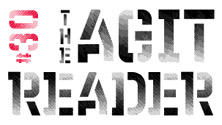
Big Bangs, Black Holes, Meteorites, etc.
by Stephen Slaybaugh
Forming out of the ashes of Girlfriendo, Gothenburg, Sweden’s Love Is All burst on the international indie rock underground in 2005 with an invigorated breath of fresh noise. A conflux of jittery riffs, sax squeals and sweet lyrical hooks, the band’s sound may have fallen in line with such luminaries as Kleenex and X-Ray Spex, but the frenetic pop in which the band specializes was a welcome diversion from the bastardized disco dominant at the time. A collection largely comprised of previously released singles, Nine Times the Same Song was wonderfully brazen, a record seemingly built out of pure, brimming enthusiasm.
Three years later, the band finally returned with a follow-up and “proper” studio album, A Hundred Things Keep Me Up At Night (What’s Your Rupture?) in November. Like its predecessor, the album is marked by a boisterous sound, a joyful racket that never skips a beat. Whizzing by in less than 33 minutes, it’s an accomplishment that the band hasn’t suffered any emotional letdown during the intervening time, even when losing integral sax player Frederik Erikkson.
I sat down with guitarist (and sometimes vocalist) Nicholaus Sparding last month before a show in New York that turned out to be as adrenalized as the band’s records.
Before the last album, you released a bunch of singles. Is the music industry in Sweden like that in the UK, where you have to release singles?
Nicholaus Sparding: No, not at all. Maybe the indie scene in Sweden is like that, but I don’t think that anyone releases anything at all in Sweden, maybe mp3s. I don’t know a lot bands in Sweden that release 7-inches.
What is the music industry like in Sweden then?
NS: It’s very much like the media chooses a couple artists and supports them for a couple years. It’s mainly been singer-songwriters right now and has been for a few years.
Jose Gonzalez was just here for a performance of Brazilian music at the Brooklyn Academy of Music.
NS: He’s a good friend of mine. I used to tour and play percussion with him until we started touring as Love Is All.
There’s a lot of Swedish bands that have been making waves here. But it seems like you feel more of an affinity with the American underground.
NS: Maybe, I don’t know why. We’ve been playing here much more than we’ve ever played in Sweden. We’ve become friends with caUSE co-Motion, touring with them, and we know the guys in Crystal Stilts. So there’s a lot of people here that we know, and we feel more comfortable musically than we do in Sweden.
The music fits in better?
NS: Yeah, I think so. People in Sweden tend to think of music in a very technical way. It must be very professional, and it seems like people actually think about that while they’re watching a concert. But it’s not the same way here, and people can go between genres here. People don’t have to be part of the indie crowd to appreciate our music, which would not be the case in Sweden. It’s much easier to play here. I think Great Britain is actually the hardest place to play because the way you look and the way you dress is so important. It’s a bit more free here.
From what I’ve heard, it’s pretty tough to be a small indie band playing rock music there.
NS: Yeah, I remember Parlophone trying to make us big by putting up all these huge posters in the subway. It was weird. We were just a typical indie band that needed to play small shows, and if people liked it then we’d play bigger venues. It was weird that they pushed us so hard.
You’ve pretty much parted ways now, right?
NS: Yeah we did. They couldn’t afford to release our record.
Did you find someone else to release it in Europe?
NS: No, we haven’t.
So it’s not out there?
NS: No, it isn’t. We got an offer from Parlophone to release us from our contract, so now we’re free to use anyone we like. So we’re in a good position.
The first album was basically a collection of those singles. Do you feel like One Hundred Things is more cohesive as an album?
NS: I don’t know. Of course, we knew we were going to make an album this time, which was sort of distracting because then you want to hurry on to the next song. But I think we just tried to do one song a day.
Just took it song-by-song?
NS: Yeah, we try to do that. But the new album was more than a struggle than we thought it would be. There were expectations from record labels and fans. What is it, “the hard second album?”
So you felt pressure?
NS: Yeah. We had toured for the first album for a year or so, and we were kind of tired of how we sounded. So we needed to experiment for awhile. But then it turned out to sound the same anyway.
Your sax player, Frederik, left. Was it difficult to find another sax player?
NS: Yeah, it was difficult. Not everyone plays saxophone, you know? The new guy (Ake Stromer) is a great guy. He started playing with us a year ago. He had never touched a saxophone before, but he learned in a few months just so he could play with us. He was a big fan.
If you hadn’t found someone, could Love Is All have existed without sax?
NS: We did a couple shows without saxophone after Frederik left. It was pretty hard. I tried using delay pedals to make it sound more crazy, but it didn’t work. I definitely didn’t like it as much. It’s a big part of our sound.
Aside from the difficulties and pressure you were talking about, it seems to me that Swedish bands take a long time to put out records in general. The Soundtrack of Our Lives, the Hives—everyone takes three years to put out a record. Is there a more relaxed approach to making music?
NS: I don’t know. I think maybe people in Sweden take longer because they’re more anal about it.
Does that come from the professionalism expectations you were talking about?
NS: Yeah, but not in our case. This record was done more than a year ago. We weren’t satisfied with the mixes, and we had a lot of discussions and arguing with Parlophone about putting it out, So it should have come out last year.
When you guys were starting out, was there a conscious decision to sing in English rather than Swedish?
NS: It was natural to do that. Everyone in Sweden knows English very well. And most bands in Sweden sing in English because it’s such a small market, especially for a band like us, an indie band that hardly anyone likes . It’s going well in Sweden, but we could never live off of it. We would sing in Swedish...
Dungen sings in Swedish.
NS: I was listening to that today and thinking about it. I like the lyrics a lot. But you guys don’t know what he’s saying. Still I think it’s very natural for most people to sing in English.
Is that just from having so much pop music from English-speaking countries.
NS: Yeah, and Josephine lived in England for a couple years and is married to Wyatt (producer Wyatt Cusick), who is from San Francisco, and Markus’ girlfriend is from New York.
Is it at all hard to put your thoughts into English?
NS: I have some difficulties, but Josephine writes all the lyrics.
So you don’t feel like anything is lost?
NS: I think it’s kind of hard to write lyrics in English, I do, and do interviews, too. Naturally, it’s not the same thing. I stop myself sometimes.
It seems like a good amount of the songs deal with the mundane parts of life. Is making music a way to escape boredom?
NS: It definitely was and I think it still is. We worked boring day jobs, and it came out of frustration, just to get it out.
You get a lot of comparisons to bands from the ’80s. Is there any attempt to emulate those bands or that sound in general?
NS: I don’t know. Maybe some members of the band want it to sound like that, but I think the music is all based on misunderstandings.
Misunderstanding of?
NS: Of each other in the band. Every time we get theoretical, it gets messed up. We get frustrated and decide not to talk about it and just play. And everyone is really theoretical when it comes to talking about music. There’s no end to it sometimes.
Speaking of theoretical, is there an overarching idea behind the name Love Is All?
NS: We used to have three different answers to that. The true story is that Josephine saw an episode A Man From UNCLE and there was a Christian sect. They were committing collective suicide and they had posters that said, “Love is all.” She thought it sounded good. I guess as far as the theme, some of the first songs were about love, but they aren’t anymore. It’s a good statement, though.
Yeah, the songs’ takes on relationships are kind of twisted.
NS: They’re kind of cynical.
NS: It would be hard without the humor to be preaching love these days.
